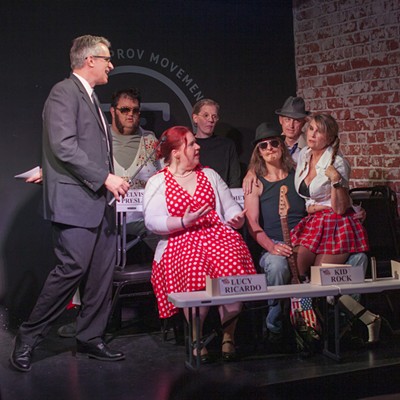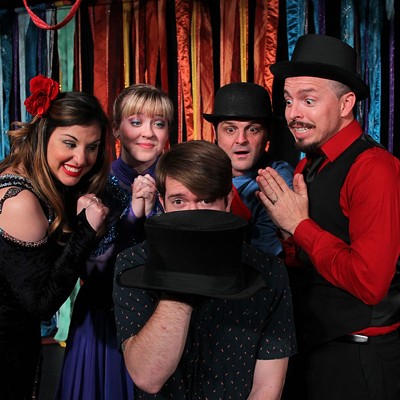Sometimes a play can seem deceptively simple. Live Theatre Workshop's Half and Half, by James Sherman, is such a piece, and the challenges it offers become obvious in this good-hearted though uneven production.
Sherman's 2008 play spans several decades, but we only see one day in April 1970, which constitutes the first act, and a day in July 2005, which makes up the second.
The 35 years in between were a tumultuous period in which social issues, especially those of family and marriage and gender roles, were called to a reckoning. In ways both violent and subtle, a social revolution challenged the entrenched status quo, which couldn't escape a major overhaul. Exactly what the outcome would be was ill-defined and ultimately unpredictable. Liberating for some and threatening to others, that revolution deposited us where we are today, still trying to sort out our familial and personal relationships.
The play opens on the very first Earth Day, in 1970, a morning that is busy and bustling for Susan Grant (Kristi Loera). She flits about the kitchen, fixing breakfast for her husband, Stewart (Rick Shipman), and their daughter, Lucy (Shannon Rzucidlo). Susan seems wound up as tight as a Latin teacher's bun, trying both to please and placate her husband, instructing him in great detail how to warm the casserole she has prepared for his dinner.
She won't be home to oversee the family meal because she intends to participate in the Earth Day rally. Stewart has no trouble calling this plan foolish and ridiculous. But Susan, who has been reading Betty Friedan, declares that she needs to participate in things that are meaningful for her. She wants to feel more like a woman than an efficient machine—like the top-of the line vacuum cleaner Stewart recently purchased.
Susan tries earnestly to tell Stewart she is unhappy as a person, as a woman, and as a wife—even suggesting they get marriage counseling—but her clueless husband demeans her. He tries to ascribe his anger, rather pointlessly, to more than just his wife's shen-anigans. After his wife and daughter leave to attend the rally, he takes his frustration out on the kitchen window, putting his fist through the glass.
In Act 2, the day after Independence Day 35 years later, in the same kitchen, the scene pretty much repeats itself. Only now, sitting at the kitchen table is grown-up Lucy, played by Loera. Power-suited and distant, she waits for breakfast while focused on papers and a laptop. Her husband, Jeremy (Shipman), buzzes around the kitchen preparing frittatas, sharing secrets with daughter Katie (Rzucidlo), and generally feeling unappreciated and unhappy with his distracted wife and his empty life.
It takes only moments for us to realize that the world has indeed turned, but only to return to a place eerily similar to where it began its wild rotation.
Sherman uses a twist on a recognizable convention to tell us his story. Some might call it a gimmick. Under Missie Scheffman's direction, Sherman's piece does sometimes descend into gimmickry, thereby disguising or at least detracting from the more serious issues the playwright intended to explore. On the other hand, Sherman undercuts himself as he uses just about every cliché in the book, both in the pre- and post-modern gender worlds he has created.
In the older world, there are plenty of laughs as we recognize and reminisce about those days of consciousness-raising groups and teach-ins and bra-burning, as well as some bitter memories, as when we are reminded that psychiatrists were all too willing then to prescribe tranquilizers to numb women's growing pains. Granted, in 1970, these things weren't clichés. But seeing them embodied in 2011—especially given the light tone of the piece—that's what they are now.
In the second act, we again are treated to what we already recognize as cliché-rich stereotypes—the sensitive stay-at-home dad; the working mom, single-minded and ambition-driven; and the high school girl, over-scheduled and texting-focused, who simply must have a nose job to add perfect looks to her plans for a perfect life.
The result is a play with a bit of an identity problem, which the title captures quite eloquently. Although the set-up is tidy and the clichés provide laughs, they actually get in the way of credibly delivering the substance Sherman seems to be aiming for. Not only does each of the actors have to create two credible and sympathetic characters, they have to find a way to take these characters beyond caricature—within a somewhat gimmicky framework full of stereotypes and clichés.
It's a lot for Sherman to ask, and LTW's ensemble has not quite found a way to make it all work.
Sherman also employs some rather hamfisted symbolism. The window smashed at the end of the first act is boarded up during the second, leaving us to believe that it hasn't been repaired in 35 years. But when Lucy and Jeremy at last seem to find the mutual respect they need to endure the difficulties of their life together—which involves a very engaging exegesis of the Foundations' song "Baby, Now That I've Found You"—they decide it's time to tear down the plywood. This, of course, is a way of saying "let the sunshine in."
We halfway expect the cast to break into "The Age of Aquarius" from the musical Hair, which frankly would be more fun and effective than the overly obvious ending we are left with.
Admirable effort from this group is evident, and this is a pleasing enough production. But it's not a slam-dunk piece of theater. It's often fun, often charming, and stirs some memories. Perhaps most importantly, it reminds us that we all need to attend to our consciousness-raising every step of the way.










